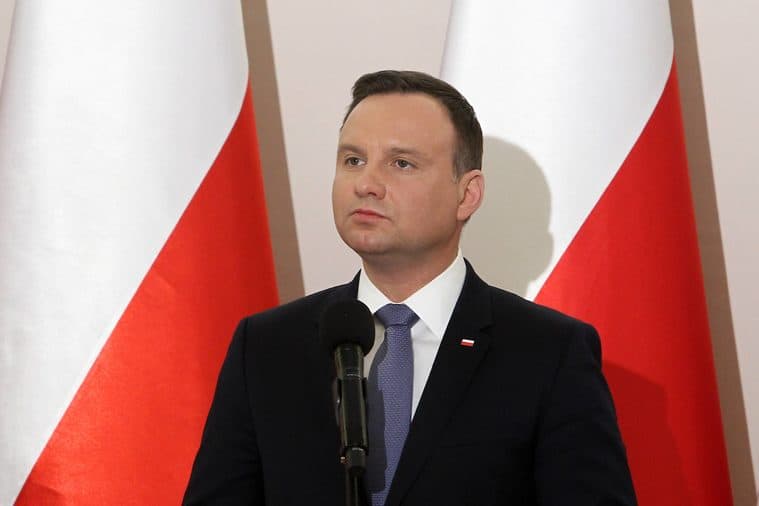Mister President,
Your Excellence,
Ladies and gentlemen,
Dear friends,
It’s an honor for me to be with you tonight.
I would have liked to be able to speak in English tonight, but I will avoid causing unnecessary pain to your ears, so I will continue in French if you allow it.
Les juifs influencent la vie économique et politique du monde, il faut s’en méfier, ils sont responsables de la mort de Jésus, ils ne peuvent s’intégrer dans la société, on parle trop de la Shoah, ils sont derrière les attentats du World Trade Center, ils sont responsables de la fabrication et de la diffusion du virus du Covid, ils ont volé la terre aux Palestiniens, Israël est un Etat raciste, un Etat nazi.
Ces stéréotypes devraient dater d’un autre siècle, ils sont malheureusement toujours d’actualité, aux Pays-Bas, en Grèce, en France, au Portugal, en Allemagne, en Hongrie, en Pologne, en Roumanie, en Slovaquie, en Europe de l’Est comme en Europe de l’Ouest.
Depuis 20 ans, nous assistons, impuissants, à une montée de l’antisémitisme en Europe, qui ne se contente pas de vociférer et d’injurier, mais qui frappe, qui torture, qui fait aussi couler le sang, qui assassine.
Sur les réseaux sociaux, des centaines de milliers de contenus antisémites, mélangeant préjugés, complotisme, indigénisme, déni de la Shoah, amalgames avec le nazisme, détestation des juifs et d’Israël sont diffusés puis partagés, relikés, commentés, retweetés se multipliant encore et encore jusqu’à atteindre des millions.
Condensant colère, frustrations et ignorance, cette haine s’infiltre pernicieusement dans la société en recherche constante de boucs émissaires et se dévoile dans les manifestations en Europe : celles des Gilets Jaunes, celles des Antivax, celles en soutien au Peuple Palestinien.
La banalisation du mal rampe là où nous pensions naïvement l’avoir expurgée à tout jamais : 80 ans après la Shoah, dans les rues de Berlin, berceau du nazisme, on a crié, drapeau palestinien à la main et fanatisme sur le visage « mort à Israël, mort aux juifs ».
D’années en années, l’obsession antijuive évolue, les accusations sur lesquelles elle se fonde aussi.
Au gré de l’actualité, les habits antisémites du présent se drapent d’antisionisme, d’islamisme, de complotisme, de négationnisme ; Ces visages sont tantôt celui de l’extrême-droite, tantôt celui de l’extrême-gauche, parfois les deux.
L’extrême-gauche s’est retrouvée une spécialité : Israël, comme incarnation du Mal.
Diaboliser l’Etat Juif, l’accuser de pratiquer une politique d’Apartheid, comme l’ont récemment fait les députés d’extrême-gauche en France, l’essentialiser et le racialiser jusqu’à le nazifier, c’est permettre la levée de tous les interdits contre les juifs.
Jankélévich aime à rappeler que « si les juifs sont des nazis, ils méritent leur sort » ou encore que « L’antisionisme est une aubaine car il nous donne la permission, et même le droit, et même le devoir d’être antisémites au nom de la démocratie »
La haine du juif se drape derrière le drapeau vertueux de l’anticolonialisme. Pire encore, cette « Israélophobie », cette acrimonie passionnelle et obsessionnelle, s’exprime au nom des droits de l’Homme et elle ne serait être confondue avec la critique légitime de la politique d’un gouvernement. Rappelons-le sans cesse : Israël est la seule démocratie du Proche et du Moyen Orient. Une démocratie dans laquelle les citoyens bénéficient d’une égalité de droit quelle que soit leur origine. C’est parce que cette démocratie est précieuse et que la séparation des pouvoirs l’est tout autant, que les Israéliens l’expriment par milliers chaque samedis soirs depuis plusieurs mois dans les rues de Jérusalem, de Haifa, de Tel-Aviv ou d’Ashdod.
Ceux qui détestent Israël ne s’embarrassent jamais de dénoncer les attentats de civils, les roquettes tirées par milliers dans un ciel protégé par le Dôme de fer, les boucliers humains, les tunnels construits pour frapper la population civile ; ils ne blâment jamais les pensions versées aux familles des terroristes ; ils ne condamnent pas les journalistes que le Hamas bâillonne, les femmes qu’il lapide ou les homosexuels qu’il emprisonne, voire qu’il exécute.
Ceux qui détestent Israël gardent le curieusement silence sur les minorités opprimées dans le monde, sur les atteintes aux libertés fondamentales des peuples Iraniens, Ukrainiens, Soudanais, Cubains, Arméniens, Kurdes ou Ouïgours.
Ceux qui détestent Israël ne réprouvent jamais les programmes éducatifs fondés sur la haine du juif, les comptines que les enfants de 6 ans récitent avec application racontant à quel point il est bon d’être un martyr.
A cet égard, je me réjouis que le Parlement Européen, ait enfin adopté il y a quelques jours, grâce notamment à l’action formidable de plusieurs collègues dont mon amie Ilana Cicurel, une résolution condamnant l’Autorité palestinienne pour le contenu « haineux » de ses manuels scolaires et subordonnant le financement futur de l’éducation à la suppression du contenu antisémite.
Pour la première fois, une résolution de l’Union Européenne établit un lien direct entre le contenu des manuels scolaires de l’Autorité Palestinienne et le financement du terrorisme palestinien, et en particulier des attaques perpétrées par des jeunes.
Au commencement de la violence, il y a la pensée. A la pensée s’ajoute la parole, celle qui instrumente au nom de dieu.
Ce désir de croire plus fort que le goût de la vérité, cette hostilité assumée, s’invite dans les prêches de certains imams radicaux alimente l’islamisme et arme les terroristes.
L’extrême-gauche porte ainsi, par électoralisme et par idéologie, une lourde part dans le renouveau de l’antisémitisme en Europe.
Cet état de fait ne doit cependant surtout pas nous faire oublier les dangers de l’extrême-droite.
Ne soyons pas dupes de sa tentative de dédiabolisation, notamment en France, où le Rassemblement National cherche une nouvelle respectabilité et a prétendu à la Présidence du groupe d’étude sur l’antisémitisme à l’Assemblée nationale.
Cette volonté d’honorabilité ne saurait éclipser que l’antisémitisme est contenu dans son ADN, dans son projet, comme objectif ou comme conséquence.
L’extrême-droite démontre, si besoin en était, en Hongrie, en Pologne ou en Italie, qu’elle doit rester un repoussoir pour tout juif en Europe et dans le monde au nom de son projet d’exclusion et de sa xénophobie, contraires aux valeurs du judaïsme.
Il est de notre responsabilité de dire à la droite européenne que si elle aime Israël parce qu’elle n’aime pas les musulmans, alors nous ne voulons pas de cet amour.
En France, nous vivons un temps politique inédit : au sein de l’Assemblée nationale dans laquelle j’ai l’honneur de siéger comme députée de la 3ème circonscription de Paris pour le groupe Renaissance, deux groupes d’extrême-gauche et d’extrême-droite, représentants 184 députés sur 577 ont été élus en juin 2022.
Au-delà de leurs accointances, comme leur soutien larvé à Vladimir Poutine, leur volonté de mettre à mal la République et ses fondements institutionnels, leurs électeurs partagent des points communs :
Selon une étude Fondapol pour AJC, ces électeurs des extrêmes justifient le recours à la violence pour contester les décisions politiques, et partagent de nombreux poncifs antisémites.
C’est dans ce climat délétère que plusieurs députées ont récemment reçu des missives antisémites abjectes.
Au-delà des discours, il y a maintenant une urgence de vérité mais surtout une urgence de résultats.
Je déposerai prochainement, sur proposition de la DILCRAH, une poposition de loi pour permettre la délivrance d’un mandat d’arrêt international pour les auteurs de délits racistes ou antisémites, et de contestation de crimes contre l’humanité.
Notre combat est difficile, semé d’embûches, mais nous avons tous, quel que soit notre rôle, notre statut, notre profession- politiques, journalistes, artistes, militants associatifs- un rôle à jouer. Il nous appartient de continuer à alerter et à analyser, sans crainte ni ambiguïté, car l’ennemi se nourrit du silence, de l’inquiétante indifférence, de l’absence de clairvoyance et de lâcheté.
« Le courage, c’est de chercher la vérité et de la dire » nous rappelait Jean-Jaurès.
Etre courageux en politique c’est appréhender les responsabilités de chacun et les causes de ce Mal, qui, parce qu’il touche à notre humanité, est bien l’affaire de tous.
Etre courageux en politique c’est dénoncer, au-delà des positions consensuelles, les sujets qui fâchent et accuser ceux qui doivent l’être.
Ce combat est le nôtre.
Je sais pouvoir compter sur vous. Vous pouvez compter sur moi.














